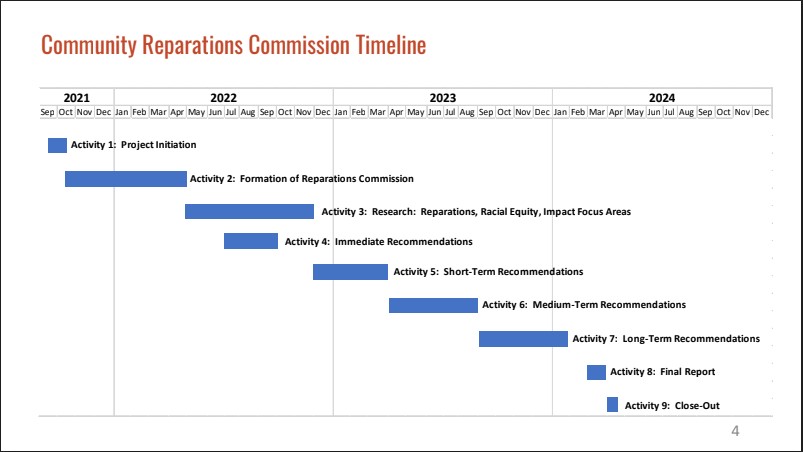By Nikki Gensert
Asheville’s Community Reparations Commission debated how to involve youth in its work during its June 27 meeting, continuing a discussion floated by commission Chair Dwight Mullen May 23. The group, tasked with developing recommendations for the city and Buncombe County to address the impacts of systemic racism, currently consists of 25 members and seven alternates but has no youth representation.
Dewana Little, the commission’s vice chair, presented four options for youth engagement: have commission members meet with local youth organizations on a monthly basis; create a separate Black youth council to suggest priorities for the commission to consider; appoint Black youth liaisons to commission focus groups; or appoint youth members to the commission itself.
Representatives from Black youth organizations advocated for youth involvement in the reparations commission. “We have to make sure that we’re including our youth,” said Keynon Lake, executive director of My Daddy Taught Me That. “I think this committee would do great justice by allowing our youth to be a part of it.”
Lake and other speakers bemoaned what they called a lack of space and resources for Black youths in Asheville, pointing to closed recreation centers and a lack of the historically Black colleges or professional sports teams that often provide those services in larger cities. Youth representatives who had been invited to the discussion declined to speak.
Some members of the commission expressed concern that discussions over including youths were taking time and focus away from progress toward the commission’s goals.
“As a commission, we’re not getting our work done. We’re sitting here, we’re talking about all this that we have got to do,” said Bobbette Mays, “This process of how you would bring youth into this group — you want to pay them, you want to interview them, you want to schedule them to be in our meetings. We’re already meeting once a month. Time is winding down.”
Dee Williams suggested that decisions on youth involvement be delegated to a committee, and Little put forward a motion to that effect. After Mullen said the commission was not prepared to vote on the matter, however, the motion did not receive a second, and the discussion was tabled until the next meeting.
Asheville, Buncombe discuss ongoing reparations funding
Commission members also heard a presentation from city and county officials about reparations funding in their respective fiscal year 2022-23 budgets.
At the time of the meeting, Asheville had proposed $500,000 for reparations in its budget, which was subsequently approved in a 6-1 vote by City Council June 28. In the budget initially proposed by City Manager Debra Campbell May 24, that figure had been $365,000, meant to replace the funds spent on a contract for consulting firm TEQuity to oversee the reparations process.
Brenda Mills, the city’s director of equity and inclusion, said staff will recommend that at least $500,000 for reparations be considered as part of the budget each year, “subject to financial feasibility and budget approval by City Council.” Asheville’s reparations fund currently contains about $2.23 million.
The reparations fund may also receive money from hotel developments that opt to contribute as part of meeting the city’s public benefits table requirements. This system allows developers to avoid bringing hotel projects before Council if they meet certain criteria, including making contributions to affordable housing or reparations. Mills said that the city is considering a similar benefits table for other types of development.
Reparations commission members questioned the city’s decision to not fund reparations in perpetuity, a request they had voted to recommend May 23. Little said she was also confused by the city’s recommendation of a dollar amount instead of a percentage of the budget, as had been discussed in prior meetings. (The recommendation voted on by the commission did not include a specific dollar amount or percentage.)
Mills emphasized that the commission should submit recommendations with specific funding needs. She said that the commission should write a letter to the city and the county stating exactly what it wants.
“You need to come up with recommendations that have dollar amounts,” Mills said, “We can’t fund something if we have no dollar amounts.”
Meanwhile, the Buncombe County Board of Commissioners authorized $2 million for reparations as its members unanimously approved the county’s budget June 21. Rachel Edens, Buncombe’s chief equity and human rights officer, said the allocation is intended to fund reparations recommendations through June 2023. The county commissioners will consider any additional budget appropriations after that deadline as part of their annual budget cycle.
TEQuity’s Debra Clark Jones presented an updated timeline for the reparations commission that would have the group issue its final report in March 2024. When the commission was first announced, it was expected to publish that report by April 2023.
The commission is currently in the third of nine phases proposed by Jones, a seven-month research period that will include expert testimony, community panels and documenting harm. Members will simultaneously work to create immediate recommendations, to be submitted to the city and the county by October. That deadline was established after commission members said they wanted to get something concrete done before the November election cycle.




Before you comment
The comments section is here to provide a platform for civil dialogue on the issues we face together as a local community. Xpress is committed to offering this platform for all voices, but when the tone of the discussion gets nasty or strays off topic, we believe many people choose not to participate. Xpress editors are determined to moderate comments to ensure a constructive interchange is maintained. All comments judged not to be in keeping with the spirit of civil discourse will be removed and repeat violators will be banned. See here for our terms of service. Thank you for being part of this effort to promote respectful discussion.